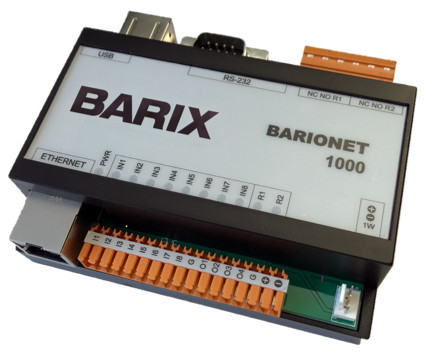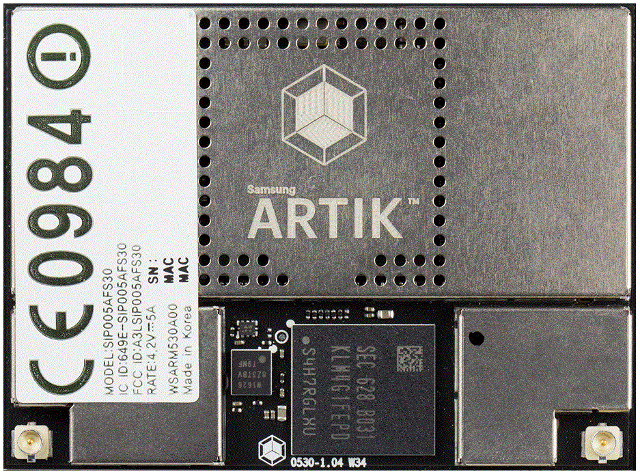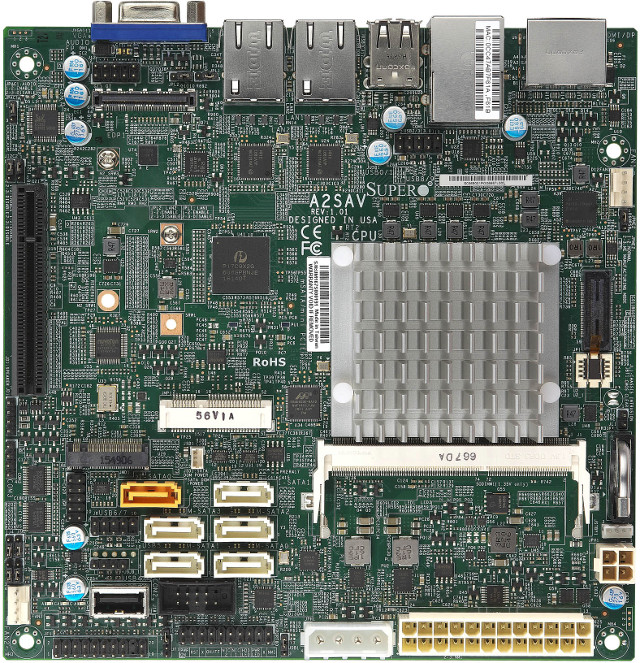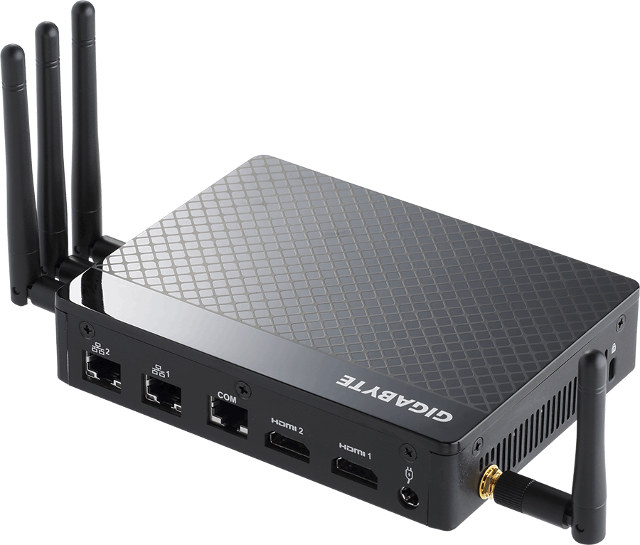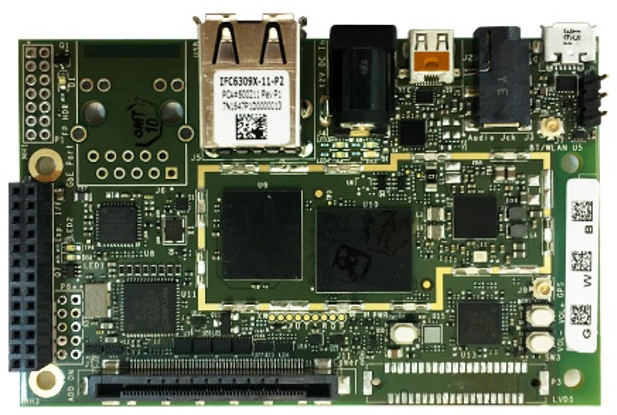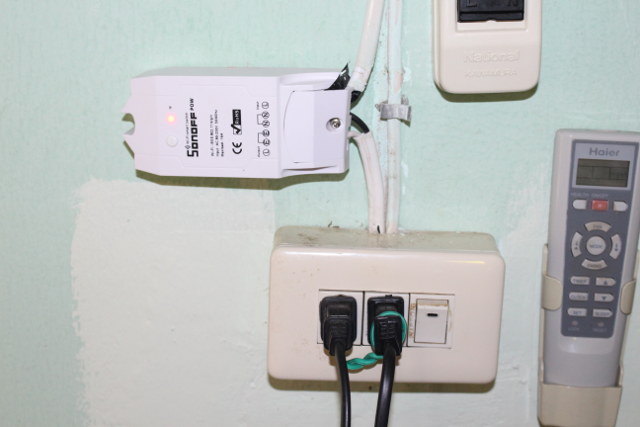Barix, a Swiss company specializing IP- based communications and control technology, has introduced a new Barionet programmable I/O controller with Barionet 1000, the first model of the company to run Linux, and in this case OpenWrt, and to offer WiFi and USB connectivity. Barionet 1000 specifications: Processor – Undisclosed System Memory – 64MB RAM Storage – 16MB flash Connectivity – 10/100M Ethernet, Wi-Fi 802.11 b/g/n; IPv4 & IPv6 support. USB – 2x USB Host Ports Serial – 1x DB9 RS-232 serial port User programmable I/Os 2x relay outputs (30 VDC max, 5 A) 4x open collector digital outputs (4 x 24 VDC, 0.3 A) 8x contact closure inputs (0 – 15 V), including 4x 12-bit analog inputs (0 – 15 V) 1-wire interface for 18DS20 temperature sensor Misc – 11 LED status indicators Power Supply – 9 to 30V DC (2.5 Watts max) Dimensions – 103mm x 85mm x 31mm; […]
Samsung Introduces Artik 530 IoT Module & Development Kit with WiFi, BLE, and Zigbee/Thread
Samsung unveiled Artik 1, Artik 5, and Artik 10 IoT modules & development board families in 2015, but since then they dropped the Artik 1 family, and instead launched Artik 0, Artik 5, and Artik 7 modules and boards late last year. More recently the company canceled the more powerful Artik 1020 development board, but the Artik project is still going on, as they’ve just added Artik 530 module & development kit to their Artik 5 family. Samsung ARTIK 530 module specifications: SoC – Unnamed Quad core ARM Cortex A9 processor @ 1.2 GHz with a 3D graphics accelerator System Memory – 512 MB DDR3 Storage – 4GB eMMC v4.5 flash Connectivity – Dual band SISO 802.11 a/b/g/n WiFi, Bluetooth 4.2 LE + Classic, 802.15.4/Zigbee/Thread, 10/100/1000M MAC (external PHY required) Other Interfaces and peripherals Camera – 4-lane MIPI CSI up to 5MP (1920×1080 @ 30fps) Display – 4-lane MIPI DSI […]
Supermicro A2SAV mini-ITX Board Powered by Intel Atom E3940 SoC Features 6 SATA Ports, Dual GbE, and Up to 9 USB Interfaces
Intel introduced three Atom E3900 series Apollo Lake processors last fall that target IoT, industrial and automotive applications, and Supermicro has designed A2SAV mini-ITX board powered by Atom x5-E3940 SoC that comes with lots of interfaces include 6 SATA ports, two Gigabit Ethernet RJ45 ports, and up to 9 USB interfaces accessible from connectors or headers. Supermicro A2SAV motherboard specifications: SoC – Intel Atom x5-E3940 quad core “Apollo Lake” processor @ 1.6 / 1.8 GHz with 2MB L2 cache, 12 EU Intel HD graphics (6.5W TDP) System Memory – 1x 204-pin DDR3 SO-DIMM socket for 2, 4, or 8GB 1866/1600/1333MHz Unbuffered non-ECC 204-pin SO-DIMM DDR3 Storage 6x SATA3 ports include 2x from SoC, and 4x via Marvel 88SE9230 controller 1x SATA DOM (Disk on Module) power connector 64Mb SPI Flash EEPROM with AMI UEFI BIOS supporting Plug and Play (PnP), DMI 2.3, ACPI 5.0, USB Keyboard, SMBIOS 2.7.1, and UEFI mSATA […]
Embedded Linux Conference & OpenIoT Summit 2017 Schedule
The Embedded Linux Conference 2017 and the OpenIoT Summit 2017 will take place earlier than last year, on February 20 – 23, 2017 in Portland, Oregon, USA. This will be the 12th year for ELC, where kernel & system developers, userspace developers, and product vendors meet and collaborate. The schedule has been posted on the Linux Foundation website, and whether you’re going to attend or not, it’s always informative to check out the topics. So as usual, I’ll make a virtual schedule for all 5 days. Monday, February 20 For the first day, the selection is easy, as choices are limited, and the official first day it actually on Tuesday. You can either attend a full-day paid training sessions entitled “Building A Low Powered Smart Appliance Workshop“, and the only session that day: 14:30 – 15:20 – Over-the-air (OTA) Software Updates without Downtime or Service Disruption, by Alfred Bratterud, IncludeOS […]
FOSDEM 2017 Open Source Meeting Schedule
FOSDEM (Free and Open Source Software Developers’ European Meeting) is a 2-day free event for software developers to meet, share ideas and collaborate that happens on the first week-end of February, meaning it will take place on February 4 & 5, 2017 this year. FOSDEM 2017 will features 608 speakers, 653 events, and 54 tracks, with 6 main tracks namely: Architectures, Building, Cloud, Documentation, Miscellaneous, and Security & Encryption. I won’t be there, but it’s always interesting to look at the schedule, and I made my own virtual schedule focusing especially on talks from “Embedded, mobile and automotive” and “Internet of Things” devrooms. Saturday 4, 2017 11:00 – 11:25 – Does your coffee machine speaks Bocce; Teach your IoT thing to speak Modbus and it will not stop talking, by Yaacov Zamir There are many IoT dashboards out on the web, most will require network connection to a server far […]
GIGABYTE EL-30 Apollo Lake Fanless IoT Gateway Powered by Intel Pentium N4200 to Launch in Q2 2017
GIGABYTE will soon introduce their EL-30 “Intel Apollo Lake IoT Gateway Solution” powered by a quad core Intel Pentium N4200 with 32GB storage, dual Gigabit Ethernet ports, dual HDMI ports, WiFi and Bluetooth connectivity, as well as a mini PCIe slot for 3G module or mSATA storage, and an optional Zigbee module. GIGABYTE EL-30 specifications: SoC – Intel Pentium processor N4200 with 4 cores, 4 threads @ 1.10 – 2.50 GHz with 2MB L2 cache, 18EU Intel HD Graphics 505 (6W TDP) System Memory – 2x SO-DIMM slots for DDR3L 1600/1866MHz memory up to 8GB Storage -32GB eMMC flash + 1x SD card slot + optional mSATA module Video Output – 2x HDMI 1.4b ports up to 3840×2160@30 Hz Audio – Via HDMI ports, 3.5mm audio jack (headphone + mic), Realtek ALC255 audio codec Connectivity 2x GbE LAN ports (Realtek RTL8111HS) Pre-installed WiFi + Bluetooth module in half-size mini PCIe […]
Inforce 6309L Board is Powered by Qualcomm Snapdragon 410E Processor with 10-year Availability
Inforce Computing launched 6309 micro single board computer powered by Snapdragon 410 processor, and compatible with 96Boards Dragon 410c board, a little over a year ago. The company has sent a newsletter promoting the launch of cost-down version with long term support equipped with Snapdragon 410E processor, and named Inforce 6309L. Comparison table between Inforce 6309L board and DragonBoard 410C provided by the company: Inforce 6309L Dragonboard 410C SoC Qualcomm Snapdragon 410E quad core ARM Cortex A53 processor with Adreno 306 GPU Dimensions 54mm x 85mm Memory Storage 1GB LPDDR3 8GB eMMC Micro SD Connectivity Wi-Fi/BT/GPS Video 1080p HD video 720p HEVC playback Camera Dual cameras 13MP on MIPI-CSI Interfaces Micro USB, USB, Micro HDMI, MIPI-CSI, expansion header Micro USB, USB, HDMI, expansion header Operating System Android Lollipop 5.1 Linux (Debian) Win10 IoT core Both boards are pretty similar, except Inforce 6901L replaced the HDMI port with a mico HDMI […]
How to use Sonoff POW with ESPurna Firmware and Domoticz Home Automation System
Sonoff POW is an ESP8266 based wireless switch with a power meter that comes pre-loaded with a closed-source firmware that works with eWelink app for Android or iOS by default. But we’ve also seen Sonoff POW, and other Sonoff wireless switches from the same family, can be flash with open source firmware supporting MQTT (Message Queuing Telemetry Transport) lightweight messaging protocol such as ESPurna, and I initially sent data from Sonoff POW to ThingSpeak via an MQTT broker (mosquitto) to draw some pretty charts. I did that with the switch connected to a lightbulb, but I’ve since installed Sonoff POW in my office to measure the room’s power consumption minus the ceiling light and aircon as shown below. Sonoff cable mechanism is really a pain for hard copper wires, as they are hard to push inside the mechanism, and something come out. I finally managed by it took longer than […]


